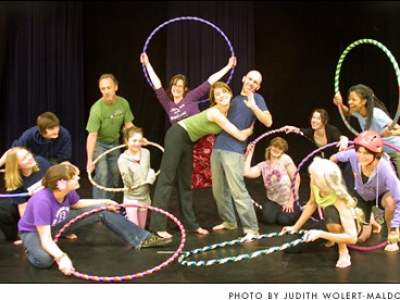College board looks at challenges, opportunity
- Published: May 27, 2010
What the newly independent Antioch College is attempting to do — reinventing itself in a faculty-centered liberal arts model — is highly unusual, a consultant told the college pro tem board of trustees on Saturday, May 8, at the board’s first meeting held in the village since the college gained independence in September.
“Nothing like this has been done in the recent past,” said accreditation consultant Len Clark, the former provost of Earlham College, at the meeting. While many online institutions have been created in recent years, along with a few new institutions with a single focus, such as the Olin College of Engineering, there has been little or no re-invention among colleges seeking to offer students a liberal arts education.
“Liberal arts colleges haven’t been creative in years,” Clark said.
Clark was responding to a question from board member Tendaji Ganges, who asked if other colleges had gone through a process of seeking accreditation as Antioch is doing. Accredited since its 1853 inception, the college lost accreditation when it was closed in 2008 by Antioch University, and needs now to start at the beginning of the complex process.
Present at the meeting were pro tempore board members Ganges of Michigan; Barbara Winslow of New York; Pavel Curtis of Washington; Joyce Idema of New Mexico; Allyn Feinberg of Colorado; Nancy Crow of Colorado; Atis Folkmanis of California, Francis Horowitz of New York, ex officio member Susan Eklund-Leen, and board chair Lee Morgan of Minnesota. Also present were Antioch College Interim President Matthew Derr, Director of Finance and Operations Tom Brookey and new Director of Communications Gariot Louima, along with many members of the college staff and Arthur Morgan Fellows.
The first step toward the Antioch College accreditation process will begin in August when the college submits to the North Central Association a Preliminary Information Form, or PIF, which contains information on the school’s proposed curriculum, its faculty, majors, the “whole plan for the college,” Clark said. The PIF will be reviewed by the NCA staff, and if the review is favorable, it will be followed by several site reviews. The process is arduous, and the best outcome is that accreditation will be granted within a year after the graduation of Antioch College’s first class, which will arrive on campus in the fall of 2011, and that students from that class will receive retroactive accreditation for their classes.
However, the PIF can also be deemed insufficient, in which case, the college needs to wait a year to re-apply, Clark said.
The key, according to Clark, is that the college submit a plan that is realistic.
“What they’re looking for is, does this institution have the resources to do what they say they will do?” he said.
Consequently, college leaders planning its new curriculum are including a modest number of academic concentrations with a faculty-centered focus, according to Interim President Matthew Derr. In his State of the College address to the board, Derr said that “an interesting aspect of the program is that it relies on common sense, the notion that you can take a small group of students and put them in a room with gifted teachers, and something elegant will come out of it.”
In their most radical move, college leaders aim to offer a core liberal arts education in a three-year time frame, partially as a way to make a liberal arts education more affordable for middle class families, Derr has said in the past.
However, several scientists who are consulting on the new curriculum are questioning whether it can be delivered in three years, according to Pro Tem Board Member Pavel Curtis, a software engineer for Microsoft.
“There will be some serious pushback from the science side,” Curtis said. “We shouldn’t get more comfortable.”
The college leaders aren’t comfortable, Derr said.
“We’re pushing against boundaries,” he said. “If this were easy, it wouldn’t be significant change.”
In this State of the College address, Derr referred to the current period as the college being “on the cusp of something great once again, an opportunity, a moment in time on which we will all collectively reflect in the coming years. I also firmly believe that it is in this moment, not a year from now, that will determine whether Antioch College is once again a catalyst for change in a world and a system of higher education that badly needs it, or one more ordinary and struggling speck on the lens of learning.”
Advancement advances
In a report to the board, Aimee Maruyama, the assistant director of advancement for the college, reported that Antioch College alumni giving has increased substantially since the college became independent.
The numbers of alumni making donations has risen to about 15 percent, from about 2 percent before the college became independent from Antioch University. This number includes over 400 first-time donors this year, a 124 percent increase in first-time donors. On average, colleges range from 30 to 50 percent of alumni who donate, so there is considerable room for improvement, she said.
Donations have increased since a fundraising letter was sent a month ago, and in the last 20 days alone $25,000 has been raised for the college capital campaign and $119,000 for its annual fund, according to Maruyama. The college this year has raised more than $1.8 million for its annual fund, toward a goal of $2.8 million. It seeks to raise $50 million in a capital campaign over the next five years.
Lois Mann, former Antioch College vice president for development, is working with college leaders on fundraising. In a report, Mann stated that based on favorable contacts she’s made with alumni, she is optimistic regarding their response to the needs of the college.
“The importance of independence can’t be overstated,” she said. “I feel the word ‘independent’ is a catalyst for support.”
In the introduction of new Communications Director Louima, board members stated that the story of current efforts to re-invent the college is unique, and should be given attention.
“To me, the compelling story is the process we’re going through now,” Curtis said. “It’s not just the flag on top of the mountain, but the climb.”
To hear an audio of the May 22 board meeting, go online to antiochcollege.org/media.html.
The Yellow Springs News encourages respectful discussion of this article.
You must login to post a comment.
Don't have a login? Register for a free YSNews.com account.
Parkinsons.jpg)














No comments yet for this article.